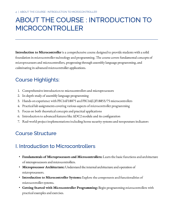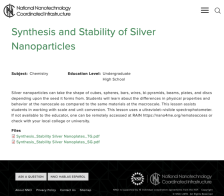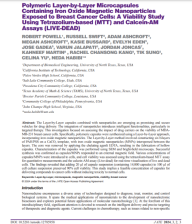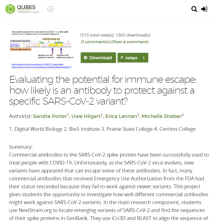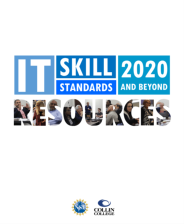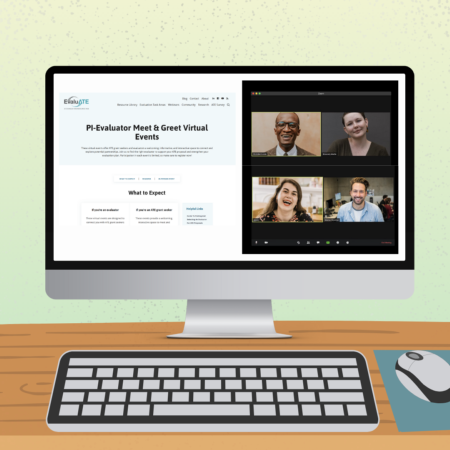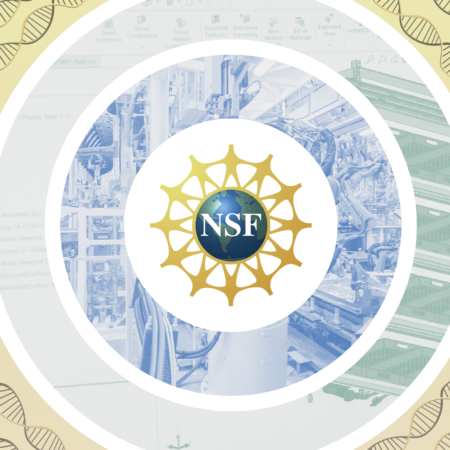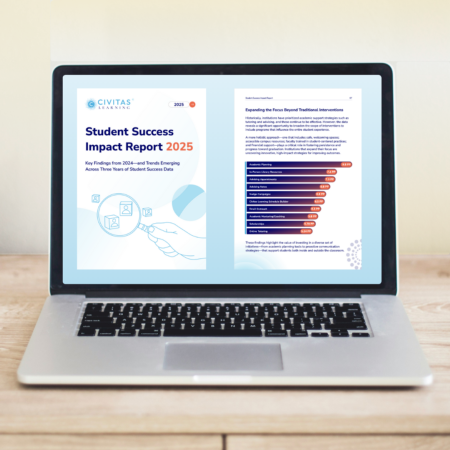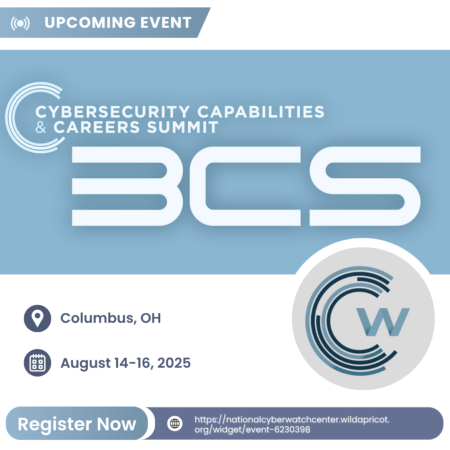ATE is Advanced Technological Education. With an emphasis on two-year colleges, the National Science Foundation's ATE program focuses on the education of technicians for the high-technology fields that drive our nation's economy.
Community Conversation: Creating Evaluation Plans for Your ATE Project
Meeting
August 19 Online
ATE principal investigators, project evaluators, and staff will discuss and share effective facilitation practices within ATE projects. Participants will exchange strategies, share experiences, and explore ways to enhance engagement and collaboration to improve project outcomes.
(View More)
Manufacturing Trends BILT Virtual Meeting
Webinar
August 21 Online
The National Science Foundation (NSF) funded National Center for Next Generation Manufacturing invites you to a key Manufacturing Trends meeting on August 21, 2025, from noon to 1 PM ET. This event will bring together industry experts to discuss the future of manufacturing, focusing on transformative changes in the sector.
The meeting will begin with targeted questions to foster dialogue and share diverse insights. The aim is to identify long-term changes affecting the industry, especially for entry-level workers, and understand the skills they will need in the future.
Participants will also discuss the impact of AI advancements on manufacturing, including automation, data analytics, and supply chain management, and how these changes are redefining job roles and competencies.
This meeting offers a valuable networking opportunity and encourages collaboration among participants passionate about manufacturing's future.
(View More)
AI in STEM Education Part 1 - Using AI Responsibly to Develop NSF ATE Proposals
Webinar
August 22 Online
Join presenters for the upcoming NSF-ATE CCPI webcast titled "Using AI Responsibly to Develop NSF ATE Proposals."
(View More)
Innovate, Educate, Connect: ATE Central’s STEMLink and Resources for Manufacturing Instructors
Webinar
August 26 Online
Join us for the August AMTEC Institute for Industry 4.0 (AI3) Community-of-Practice session! ATE Central will showcase a suite of powerful tools and resources designed to support educators in manufacturing and related STEM fields. This session will highlight STEMLink, a dynamic platform that connects instructors to resources that can be utilized in your classroom. In addition, you will explore ATE Central’s extensive resource library, ATE Impacts success stories, and more to see how to leverage these assets to enhance your classroom.
This material is based upon work supported by the National Science Foundation under Award No. 2350012. Any opinions, findings, and conclusions or recommendations expressed in this material are those of the author (s) and do not necessarily reflect the views of the National Science Foundation.
(View More)
PI-Evaluator Meet & Greet
Meeting
August 27 Online
This event provides a welcoming, interactive space to meet and connect with evaluators qualified to work on your ATE project. You’ll hear brief introductions, join guided discussions to learn about different evaluators’ approaches to evaluation and have the chance to meet with evaluators one-on-one to find the right evaluator to support your proposal.
(View More)
Azure AI Infrastructure Workshop
Workshop
September 2 Online
Designed specifically for community college faculty, this hands-on workshop explores the robust capabilities of Microsoft Azure in the field of artificial intelligence. Participants will gain practical experience with Azure's powerful AI tools and services while preparing for the Microsoft Certified: Azure AI Fundamentals exam.
The workshop covers essential AI and machine learning concepts, guiding attendees through the process of building, training, and deploying models using Azure. Topics include computer vision, natural language processing (NLP), and generative AI, with a focus on real-world applications.
In addition to technical skills, the workshop emphasizes strategies for integrating AI technologies into academic programs, equipping educators to bring cutting-edge tools into the classroom.
Key Features:
- AI Fundamentals Preparation - Tailored content aligned with the Azure AI Fundamentals certification.
- Machine Learning Essentials - Develop, train, and deploy ML models in Azure.
- Specialized AI Domains - Deep dives into computer vision, NLP, and generative AI.
- Hands-On Experience - Interactive labs and practical exercises.
- Educational Integration - Guidance for incorporating AI into curriculum and instruction.
(View More)
FABTECH 2025
Conference
September 8 Chicago, IL
Join FABTECH 2025, North America’s preeminent event for metal forming, fabricating, welding, and finishing. Explore the latest technologies, gain hands-on experience, and network with industry leaders and peers who can help take your business or career to the next level.
FABTECH is the only event where you can experience the latest in metal forming, fabricating, welding, and finishing—all under one roof. Explore 800,000+ sq. ft. of exhibits showcasing cutting-edge manufacturing equipment and advanced solutions to boost productivity. Discover industry innovations, connect with experts, and gain the tools to stay ahead in a competitive market.
(View More)
The Connecticut Manufacturing Innovation Forum
Summit
September 11 Hartford, CT
Every seat in this room will matter. Make sure one of them is yours.
Join business leaders, decision-makers, and innovators at the Connecticut Manufacturing Innovation Forum for a full day of insights, strategy, and forward-thinking solutions built for the industry's next chapter!
(View More)
Implications of Artificial Intelligence for Educators
Workshop
September 12 Bossier City, LA
This workshop empowers university, community college, and high school faculty, staff, counselors, and academic advisors with the knowledge and tools to effectively integrate AI into their teaching practices and curriculum development. Participants will explore practical applications of AI, including lesson planning, designing engaging and interactive content, creating dynamic assessments, and customizing individualized student learning experiences. Additionally, the workshop will highlight how to enable students to use AI in ethical and productive ways across various disciplines.
Through hands-on activities, collaborative projects, and real-world examples, faculty will gain a deeper understanding of AI’s transformative role in education. They will also explore new forms of student engagement, ensuring responsible AI use in both teaching and learning environments. This workshop prepares educators to harness AI to enhance classroom instruction, streamline administrative tasks, and equip students with the skills needed to navigate an AI-driven future.
(View More)
Community Conversation: Effective Data Management in ATE Projects
Meeting
September 16 Online
ATE PIs, project evaluators, and staff will explore best practices for managing data throughout the lifecycle of an ATE project. Participants will discuss strategies for organizing, analyzing, and sharing project data, as well as tools and systems that can help streamline the process.
(View More)
AACC Advocates in Action 2025
Meeting
September 16 Washington, DC
The American Association of Community Colleges Advocates in Action is a 2-day program designed for community college leaders who want an insiders view on how Washington formulates higher education policy and who want to become more involved in the federal legislative process. Interactive sessions with key executive branch officials and senior Congressional staff will provide valuable insights about the current dynamics and issues surrounding key funding and other pending legislation. Time is reserved for attendees to meet with their federal legislators to advocate for community college priorities.
Community college presidents, trustees, government relations directors, and other campus administrators are strongly encouraged to take advantage of this opportunity to network, discuss key policy issues, and advocate for critical federal programs.
(View More)
NCATC Conference
Conference
September 17 Tucson, AZ
The National Coalition of Advanced Technology Centers (NCATC) is an Affiliated Council of the American Association of Community Colleges (AACC) catalyzing a network of higher education and industry-led Strategic Partner resources that advocates, advises, and promotes the use of advanced technology applications to enhance economic and workforce development programs and services.
With over 160 members from community and technical colleges, universities, CTE high schools, adult education organizations and the corporate community, NCATC provides great networking opportunities at both their Summer Workshop and Fall Conference every year.
(View More)
Implications of Artificial Intelligence for Educators
Workshop
September 17 Seattle, WA
This workshop empowers university, community college, and high school faculty, staff, counselors, and academic advisors with the knowledge and tools to effectively integrate AI into their teaching practices and curriculum development. Participants will explore practical applications of AI, including lesson planning, designing engaging and interactive content, creating dynamic assessments, and customizing individualized student learning experiences. Additionally, the workshop will highlight how to enable students to use AI in ethical and productive ways across various disciplines.
Through hands-on activities, collaborative projects, and real-world examples, faculty will gain a deeper understanding of AI’s transformative role in education. They will also explore new forms of student engagement, ensuring responsible AI use in both teaching and learning environments. This workshop prepares educators to harness AI to enhance classroom instruction, streamline administrative tasks, and equip students with the skills needed to navigate an AI-driven future.
(View More)
ATE Projects and Centers
Advanced Manufacturing Technologies topics include:
- Additive manufacturing
- Automotive manufacturing
- General manufacturing
Agricultural and Environmental Technologies topics include:
- Agriculture and aquaculture
- Environmental technologies
- Natural resources
- Nuclear power
- Solar energy
- Wind power
Bio and Chemical Technologies topics include:
- Biotechnology
- Chemical and process technologies
Engineering Technologies topics include:
- Electronics and controls
- General engineering
- Marine technologies
- Materials technologies
- Optics
- Space technologies
General Advanced Technological Education topics include:
- Evaluation
- Learning research
- Recruitment
- Teacher preparation
Information and Security Technologies topics include:
- Geospatial technologies
- Information and communications technologies
- Logistics
- Security, information assurance, and forensics
Micro and Nanotechnologies topics include:
- MEMS
- Microsystems
- Semiconductors
This 130-page textbook, created for the ELCT 251: Introduction to Microprocessors and Microcontrollers course taught at Lake Washington Institute of Technology, provides students with a foundation in microcontroller technology and programming. Concepts covered include fundamental concepts of microprocessors and microcontrollers, assembly language programming, and microcontroller applications. Included in the textbook are a number of assignments and labs with instructions and student questions. The textbook consists of the following parts:
- Introduction to Microcontrollers
- Introduction to Assembly Language
- Assembly Language Programming - I
- Assembly Language Programming - II
- Assembly Programming - III
Upon completing this course students should be able to do the following:
- Understand and program microcontrollers
- Develop and implement assembly language programs
- Design and troubleshoot microcontroller-based systems
- Communicate effectively within a technical environment
(View More)
This lab, presented by the National Nanotechnology Coordinated Infrastructure, uses silver nanoplates as a tool to explore the relationship between shape and optical properties. Students will be able to compare material properties and behaviors at both the nano- and macroscale through the exercise, as well as experience with scale and unit conversion. A 'Teacher's Preparatory Guide' is included, featuring needed materials, detailed procedural instructions, and additional resources. A 'Student Guide' includes detailed, step-by-step instructions, space for recording data, and analysis questions.
(View More)
This resource, published by Portland Community College, is the second issue of the third volume of J ATE. J ATE is a peer-reviewed technical journal focused on community college faculty and staff who work with technician education. This journal is cross-disciplinary and encompasses all technologies under the National Science Foundation (NSF) Advanced Technological Education (ATE) Program. Some of these technologies include: Micro Nano, Biotechnology, Autonomous Technology, Cyber Security, Advanced Manufacturing, Earth Sciences, Agriculture Technology, Energy, and Welding. Some topics that cross cut across all disciplines of technician education are also covered. Those topics include: Evaluation, Mentoring, Undergraduate Research, and Applied Technician Research.
The issue spans 218 pages and highlights articles written by students based on their undergraduate research. Included are 21 full articles and a guest letter from Olivia Long, program director for the Division of Undergraduate...
(View More)
In this activity, provided by Digital World Biology, students use free, online biotechnology resources to investigate how well different commercial antibodies might work against SARS-CoV-2 variants. Students will first use NextStrain.org to locate and detect the spike proteins of emerging SARS-CoV-2 variants. Next, they will "use iCn3D and BLAST to align the sequence of the variant spike protein to a sequence of a spike protein that is bound to a commercial antibody." After identifying mutations in the antibody binding site, students will then compare "chemical bonds that would be formed between the original amino acid and the antibody with the predicted bonds that could be formed by the variant amino acid and predict whether their antibody will be effective against their variant."
Included is a 3-page instructor guide detailing each step of the activity, a 2-page student instructional sheet, activity materials, such as data spreadsheets, and an informational video on using...
(View More)
This 172-page resource was developed as a reference guide for the IT Skill Standards 2020 and Beyond project grant, explaining in step-by-step detail how to collaborate with employers to develop future-facing technical skill standards and then use that work to align curriculum to workforce needs. This guide also provides a hard copy of the final version "products" the grant created (KSA+Ts - knowledge, skills, abilities, and tasks, key performance indicators, employability skills, student learning outcomes, and degree expectations).
A companion report on the impacts and outcomes of the ITSS project is available to view separately.
(View More)
| Active ATE Centers | 19 |
| Active ATE Projects | 286 |
| ATE Resources | 6,917 |
| New Projects/Centers | 85 |
| New Resources | 120 |
ATE Resources by Subject Area
ATE Events by Subject Area
Upcoming Event: PI-Evaluator Meet and Greet
EvaluATE, the evaluation resource center for NSF's ATE program, will be hosting an upcoming PI-Evaluator Meet and Greet on Wednesday, August 27th, from 2:00-3:15PM EST. This virtual event offer a collaborative way to connect with potential evaluators for your ATE project or center, facilitating valuable partnerships and connections. During the Meet and Greet, attendees will discuss the various approaches for evaluation and have the opportunity for one-on-one sessions with available evaluators, with the goal of finding the best fit to meet your specific proposal needs.
To register for the PI-Evaluator Meet and Greet on August 27th or to learn more about the event, visit EvaluATE's website.
(View More)
NSF Announces $25.5 Million Investment in Manufacturing Research & Workforce Development
The National Science Foundation (NSF) has recently announced a $25.5 million investment in manufacturing technologies, research, and workforce pipelines. As part of the NSF Future Manufacturing Program, awards will fund nine seed projects and seven research grants across the nation.
Focus areas for investments include cyber manufacturing, bio manufacturing, and quantum manufacturing. NSF's Future Manufacturing Program underscores the importance of collaboration and interdisciplinary teamwork to propel innovation, address gaps in technologies and workforce pipelines, and strengthen the U.S. presence as a leader in manufacturing.
Visit NSF's website to read more about its recent awards.
(View More)
New Research: Student Success Impact Report
A recent report has been released by Civitas Learning, a company that provides higher ed institutions with data-driven insights to improve student outcomes. Exploring the top initiatives fostering learner achievement, the 2025 Student Success Impact Report discusses the role of personalized support, retention, resources, and sense of belonging. It dives into longitudinal findings, comparing 2021-2023 with 2021-2024 in an analysis of over 50 institutions and 5 million students. According to the report, current top initiatives with the highest impact include academic planning, in-person library resources, and advising appointments. It also notes a main takeaway from trend and data analysis: students desire support beyond the classroom, with personalized guidance and connection.
To read the free 2025 Student Success Impact Report and explore its insights, trends, and strategic recommendations, visit Civitas Learning's website.
(View More)
Upcoming Event: National Cybersecurity Capabilities and Careers Summit
This year's National Cybersecurity Capabilities and Careers Summit (3CS) will take place August 14 to August 16, 2025, at the Ohio State University in Columbus, Ohio. It aims to bring together educators, employers, policymakers, managers, innovators, and industry leaders, with opportunities to explore, learn, and collaborate on cutting-edge technologies and approaches for the field of cybersecurity. This summit will include symposiums in five areas of focus, including Learning and Instruction, Technology and Careers, and Capability Maturity. Beyond these offerings, 3CS will have interactive experiences to foster skill development, focused workshops, education- and practice-based demonstrations, focus groups, and featured presentations.
For additional information or to register for the 2025 National Cybersecurity Capabilities and Careers Summit, visit the event's website.
(View More)

 List
List